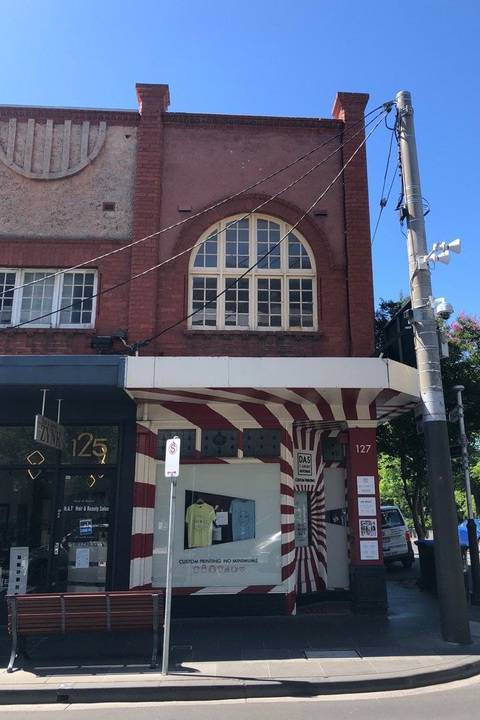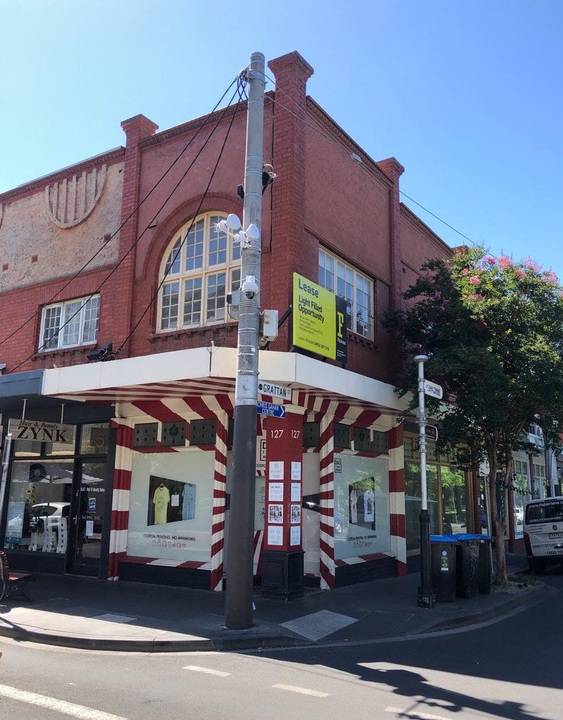| Back to search results » | Back to search page » |
|
127 Greville Street, PRAHRAN
Location127 Greville Street, PRAHRAN VIC 3181 - Property No 49109 LevelIncl in HO area indiv sig |
|
Statement of Significance
Part of the Chapel Street Heritage Overlay Precinct
What is significant?
Chapel Street is a remarkably intact commercial strip comprised
principally of late-nineteenth and early-twentieth century shops. A
number of notable individual buildings are located within the street.
These include buildings of State significance such as the Prahran Town
Hall buildings (HO15, VHR H0203) and the Prahran Arcade (HO16, VHR
H1960) and large numbers of retail and commercial premises of local
significance. This latter group includes shops from the 1850s to 1860s
(Nos 24-26, 92, 302 and others), premises from the boom and Edwardian
periods and buildings across the various periods of development of
very high individual significance such as, the former CBA Bank (No
340-44) and former Brown, Corke & Co buildings (No265-7) and the
Edwardian emporia. Postwar development is uncommon within the precinct
and, with few exceptions, is generally recessive in character The central sections of Chapel Street between Malvern Road and High
Street retain the highest concentration of significant buildings. The
character of the street derives from an impressive collection of
Victorian and Edwardian retail buildings. However its most impressive
buildings are the early twentieth century shopping emporia, a building
type more usually associated with the central city shopping district.
These emporia are all located between Commercial Road and High Street,
and include the Big Store (No 303), Osment Building (No 197-207), Love and Lewis (No 321-23), the Colosseum (No 229-241), and Read's
Stores (No 325). Greville Street developed as an important
thoroughfare linking the early civic and retail strip to the railway
station. It is more modest in scale than Chapel Street, but dates from
the same broad period(s) of development and contributes to the
character and significance of the area. Likewise, other satellite
elements such as, St Matthews Church, Cecil and Anchor Places and
some, nearby, residential buildings fall outside of the retail strip
but illustrate the range of activities that were drawn to the early
retail centre. South of High Street and north of Commercial Road (and in Commercial
Road itself), the scales of the streetscapes are similar to those of
other Melbourne suburban shopping strips. Streetscapes north of
Commercial Road retain long sequences of shops and retail groups of
ornate boom-era premises such as Conway's buildings, (Nos 411-25),
393-401 and the intact group to the east side of Chapel street between
Malvern Road and Grey Street, alongside important Edwardian premises
such as the group at Nos 403-409. The former Jam Factory dominates the
northern section of the precinct. South of High Street the built form
is similar but is realised at a more modest scale. Buildings such as
38A-40 Chapel Street and early retail premises and streetscapes,
particularly around Vine, Green and McIlwrick Streets, characterise
the area. Several notable Victorian and Edwardian shopfronts have
survived in this section of the street. The former Jam Factory and sections of the OT Cordials Factory around
Hillingdon Place recall the early manufacturing industries which once
existed in the area. Each retains an early chimney - the last two
structures of this type to survive within the Municipality. Elements which contribute to the significance of the precinct
include: - The consistent two-storey height and modest scale of the built form
north of Commercial Road and South of High Street; - The pre-eminence of the Edwardian-era emporia between Commercial
Road and High Street; - Development to front and side site boundaries of allotments; - Intactness of built form to its original state particularly above
verandah level; - The general absence of car parking accessed from the Chapel Street; - The general absence of visible upper level additions; - Mass, rather than lightweight, construction arising from buildings
realised in face or rendered brick; - The consistent patterns of fenestration, with glazed shopfronts at
ground floor level and small punched openings above; - Long sequences of Victorian or Edwardian verandahs; - Early shopfronts, throughout the precinct but particularly in
Windsor; and - Individually significant buildings throughout the precinct.
How is it significant?
Chapel Street is of architectural, historical and social
significance. The section between Commercial Road and High Street is
significant at a National level, the sections north of Commercial Road
and south of High Street, are significant at a State level.
Why is it significant?
Chapel Street is architecturally significant for its intact
streetscapes of nineteenth and early twentieth century commercial
buildings, particularly its concentration of boom period shops and its
large, early twentieth century shopping emporia usually more closely
associated with the central city shopping area. These emporia are
architecturally significant for the large range of styles used and
their references to American rather than British antecedents. While a
number of remarkable buildings and urban environments survive around
Chapel street, it is the general level of intactness and the
consistency of scale within each block that makes the whole street one
of great importance. Chapel Street is historically significant as one of the most
impressive of the shopping strips that developed along Melbourne's
cable tram routes in the late nineteenth and early twentieth
centuries. It is a reflection of the importance of the public
transport networks, that developed in Melbourne in the second half of
the nineteenth century, to the growth of the suburban shopping strips.
The early development of the strip remains legible through modest
shops, particularly in Windsor, and later, often more substantial and
more highly-decorated, boom period buildings which survive throughout
the strip. Large, early twentieth century shopping emporia clearly
demonstrate the pre-World War I retail boom although continuing
development into the interwar period remains evident. The area is
significant as a reflection of the changing shopping habits of
Melburnians between the mid-nineteenth century and the present day.
Some notable industrial buildings recall the important role of
manufacturing in the area until the relatively recent past. Chapel Street is socially significant as a one of Melbourne's
favourite shopping, recreational and entertainment areas for over a
century. It was the most important suburban shopping centre in
Melbourne in the early twentieth century, and has again become a
fashionable shopping strip, for locals as well as for tourists.
Individually significant buildings
Part of the significance of HO126 derives from the presence of large
numbers of buildings of high individual significance. Buildings graded
A1, A2 or B are considered to be significant buildings under the City
of Stonnington Planning Scheme. No individual building citations have been prepared as part of this
report. Building gradings and brief descriptions are provided in the
Schedule of Buildings appended to this citation. However, the Prahran
Conservation Study (Nigel Lewis and Associates,1983) provided detailed
assessments of some, very highly-graded buildings within the precinct.
Many of these buildings were subsequently protected under individual
heritage controls. Others were protected as part of the broad Chapel
Street/Commercial Road/Greville Street/Donald Street/Albert Street
Precinct, HO126. The Study remains a reference document under the City
of Stonnington Planning Scheme and material produced as part of that
Study should be read in conjunction with this citation The following buildings in HO126 were assessed as part of the Prahran
Conservation Study. Page numbers in brackets refer to locations in the
Study. - Osment Building, 197-207 Chapel Street, Prahran (DC/5) - The Colosseum Building, 197-207 Chapel Street, Prahran DC/7) - Former Brown, Corke & Co buildings, 265-267 Chapel Street
(DC/10) - The Big Store, 303 Chapel Street, Prahran (DC/13) - Love & Lewis Store, 321-323A Chapel Street, Prahran - Former Charles Reads Store 341 Chapel Street, Prahran (DC/17) - Conways Buildings 411-425 Chapel Street, South Yarra (DC/24) - 38A-40 Chapel Street, Windsor (12/4)
Group
Commercial
Category
Shop





